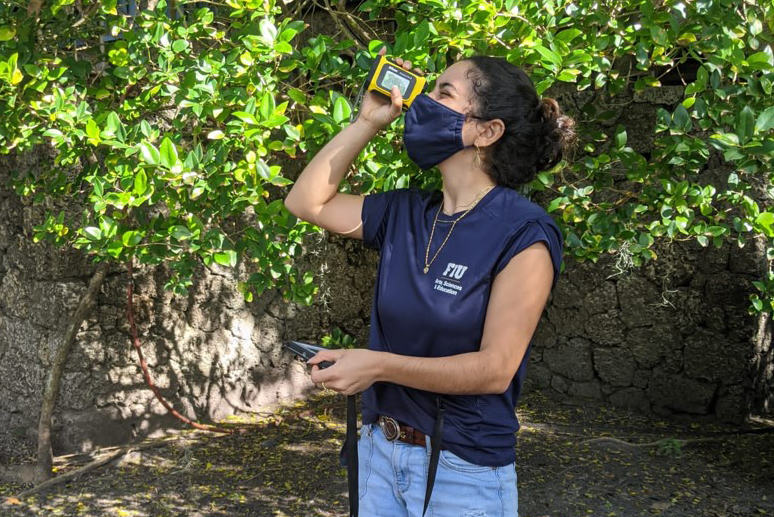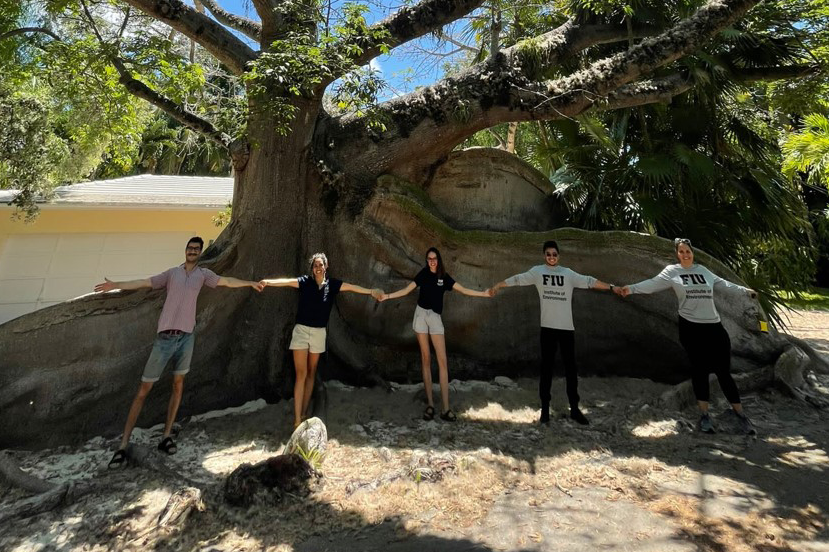Over half a century, NTBG has hosted hundreds of interns that have become leaders in plant-based careers. In this series, get to know a few of our former and current interns who are forging their paths in tropical plant science and conservation and creating brighter futures for generations of plants and people.
By Jon Letman, Editor
Raised in Miami’s Little Havana neighborhood, Barbara Herrera attended Florida International University where she earned a bachelor of science degree in environmental agriculture in 2020. Through one of her professors, she met Dr. Christopher Baraloto, Director of the International Center for Tropical Botany (ICTB) at The Kampong. He introduced Barbara to a citizen science collaborative tree data collection initiative called ‘Grove ReLeaf’ which led to her learning about an internship offered at The Kampong.
For two years, Barbara worked as a research assistant intern at The Kampong where she also did a tropical botany internship at the ICTB. Her work included identifying and measuring trees in the surrounding area, contributing to the creation of a food forest booklet, and other community outreach through workshops and seminars.
Currently Barbara is working toward a Master’s Degree at the University of South Florida in Tampa where she is focused on Latin and Caribbean studies which will benefit her as she pursues a career in ethnobotany in the Caribbean. Barbara spoke about her experience as an intern at The Kampong.
How did your internship relate to your previous studies?
I saw ICTB at The Kampong as an extension of the things I had already been doing and as a resource of global communication between botanists. There are so many opportunities to expand in an educational direction.
Has your experience with FIU and the ICTB at The Kampong steered you in a particular direction academically or professionally?
These communities and organizations were all linked in one way or another and it was on me to figure out what those links were. These are opportunities that were available and the tropical botany course at ICTB at The Kampong was phenomenal as it was centered around both international and local students. It definitely feels like all of these have made me a better academic and I continue to be influenced by all that I learned.
How did staff at the ICTB and The Kampong help you along your path?
Christopher Baraloto, Benoit Jonckheere, and other staff made me a more well-rounded individual. Their different approaches to horticulture and plant science, as well as their backgrounds, gave me a range of possible paths to pursue under the umbrella of plant science. They were always willing to provide suggestions that helped me make academic decisions toward my educational goals. They were, and continue to be, mentors to me.

How has your experience at the ICTB and The Kampong impacted your relationship with plants and nature?
Through the internship at The Kampong it was refreshing to learn about the ethnobotany of Hawaiʻi too. This helped reaffirm my passion for tropical botany. Ultimately, it was about the setting. Being surrounded by tropical flora 24/7 was everything to me and I grew closer to the plants around me as I interacted with them.
Do you plan to remain involved with ICTB at The Kampong in the future?
Definitely. I would love to do research based in the Caribbean, specifically the Dominican Republic. I feel like Miami is part of the Caribbean, so I see myself working with NTBG staff again. I try to stay connected with what’s going on at The Kampong as it has been a major source for friends and education for me.
Why should someone support internships at The Kampong and ICTB at The Kampong?
If I hadn’t gotten paid I wouldn’t have been able to dedicate the 40 hours a week for the internship. Also, for the tropical botany course, I was given a scholarship and that helped me by not needing to have another job. Thankfully, I have been funded as it makes it more accessible. Botany and other science fields have been neglected for too long so now I think it’s up to people with financial means to pay attention again and say, “maybe we need this field to flourish in a more substantial way.”

Plants nourish our ecosystems and communities in countless ways. When we care for plants, they continue caring for us. Help us grow a brighter tomorrow for tropical plants.